El 13 de julio fue instituido como el Día Mundial del Rock a raíz de que en esa fecha el año 1985 se realizó el gran concierto de rock "Live Aid", donde participaron bandas y músicos de Estados Unidos y de Europa en solidaridad con Somalía y Etiopía, para ayudarles económicamente a atravesar la situación general de hambre.
Como se sabe, el rock constituye una amalgama de expresiones musicales que ya estaban el rhythm and blues de los años 50, que luego fuera llamado rock and roll. En el confluyen blues, góspel, jazz, folk, country, en los primeros años; luego asimilará soul, funk y ritmos latinos, entre otros; incluso algo de la llamada "música clásica" y de expresiones musicales étnicas (celta, hindú, etc.). Llegó a ser, pues, un género de gran diversidad que ha dado origen a varios subgéneros.
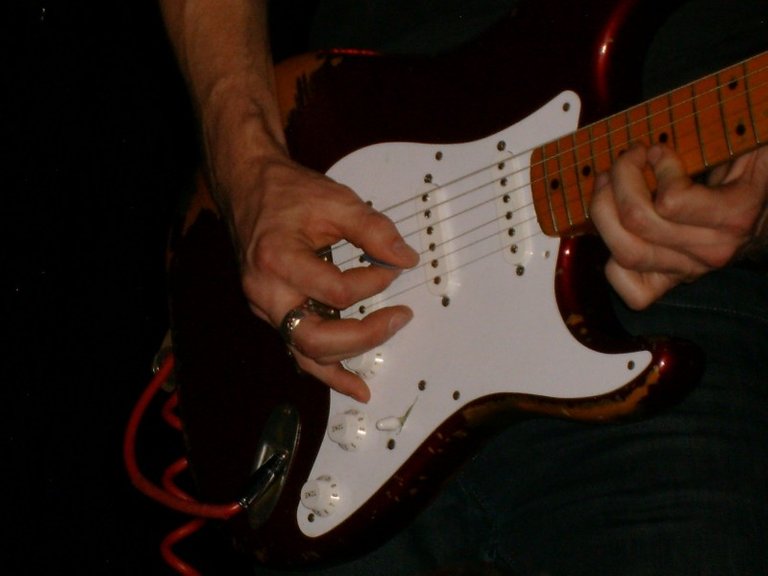
Como mi propósito en este post no es desarrollar un trabajo acerca de este género musical, recomiendo -como fuente inmediata- el artículo de Wikipedia que es muy completo en información histórica, características y clasificaciones del rock.
En dirección hacia lo que me interesa aquí, sí apuntaré que, por sus orígenes, está asociado con las luchas de los negros en USA, y con las actitudes y acciones rebeldes de la juventud, más allá de que la industria o el mercado cultural los integrara a sus intereses.
De este modo, junto a sus melodías y ritmos, hubo en el rock una manifestación literaria de relevancia en muchas de las letras de las canciones, siendo, en algunos casos, composiciones de carácter poético; de allí que pueda hablarse, sin tapujos, de *"poetas del rock". En esta primera entrega me referiré a una de esas voces: Bob Dylan.
July 13 was instituted as World Rock Day because on that date in 1985 the great rock concert "Live Aid " was held, with the participation of bands and musicians from the United States and Europe in solidarity with Somalia and Ethiopia, to help them economically to overcome the general situation of famine. As we know, rock is an amalgam of musical expressions that were already in the rhythm and blues of the 1950s, which was later called rock and roll. In the early years, blues, gospel, jazz, folk, country, etc. converged in it; later it assimilated soul, funk and Latin rhythms, among others; even some of the so-called "classical music" and ethnic musical expressions (Celtic, Hindu, etc.). It became, then, a genre of great diversity that has given rise to several subgenres.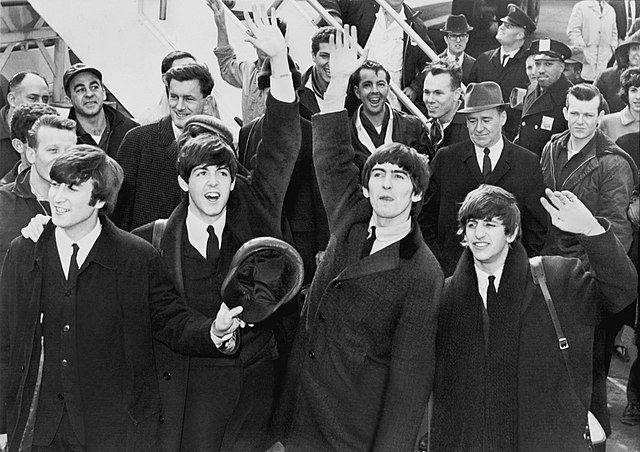
As my purpose in this post is not to develop a work about this musical genre, I recommend -as an immediate source- the Wikipedia article which is very complete in historical information, characteristics and classifications of rock. In the direction of what interests me here, I will point out that, due to its origins, it is associated with the struggles of blacks in the USA, and with the rebellious attitudes and actions of the youth, beyond the fact that the industry or the cultural market integrated them to their interests. Thus, together with its melodies and rhythms, there was in rock a literary manifestation of relevance in many of the lyrics of the songs, being, in some cases, compositions of poetic character; hence it can be spoken, without concealment, of *"rock poets ". In this first installment I will refer to one of those voices: Bob Dylan.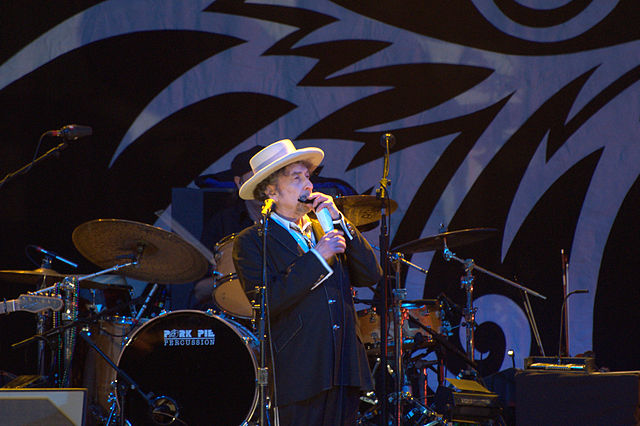
License: Atribución 2.0 Genérico (CC BY 2.0)
Bob Dylan, compositor, cantante y músico estadounidense, que ha producido una obra musical de gran influencia desde la década del 60 hasta nuestros días, y diera lugar a ese subgénero conocido como folk rock. Su labor ha tenido el reconocimiento de muchos músicos y de un inmenso número de seguidores en el mundo, pero también de la institucionalidad cultural. Así, en 2007 recibió el Premio Príncipe de Asturias de las Artes y en 2017 fue galardonado con el Premio Nobel de Literatura.
Quiero compartir aquí la letra o fragmentos de importantes canciones suyas, en las que puede notarse la fuerza lírica de protesta social o de búsqueda existencial, donde están las influencias de la poetas de la "generación beat" estadounidense, como Allen Ginsberg.
Primero de su canción al luchador y autor afroamericano, George Jackson (1972), que da título a la composición.
Desperté esta mañana
había lágrimas en mi cama
mataron a un hombre que yo realmente amaba
le dispararon en la cabeza
Oh, señor, ellos derribaron a George Jackson
Señor, Señor, y le dejaron en la tierraLo mandaron a prisión
por robar sesenta dólares
cerraron la puerta detrás de él
y arrojaron lejos la llaveNo aceptaba mierda de nadie
él no se doblegaba ni hincaba
Las autoridades lo odiaban
porque era demasiado realLos guardias de la prisión le maldijeron
mientras lo vigilaban desde arriba
pero tenían miedo de su poder
estaban asustados de su amorA veces pienso que el mundo entero
es un gran patio de prisión
algunos somos prisioneros
y otros somos guardias
(Traducción: Gabriel Jiménez Emán)
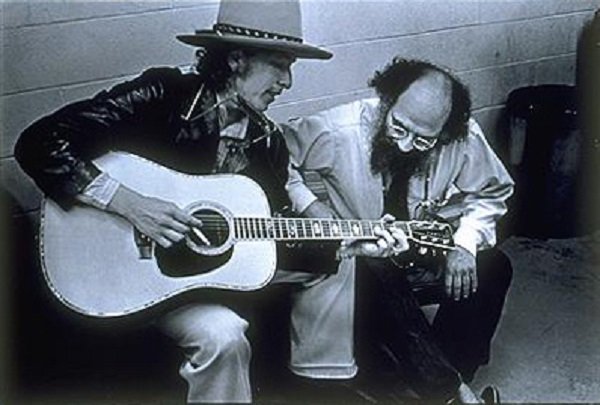
License: Atribución 2.5 Genérico (CC POR 2.5)
I want to share here the lyrics or fragments of important songs of his, in which you can notice the lyrical force of social protest or existential search, where there are the influences of the poets of the American "beat generation", such as Allen Ginsberg. First of his song to the Afro-American fighter and author, George Jackson (1972), which gives title to the composition. I woke up this mornin' Sent him off to prison He wouldn't take shit from no one Prison guards, they cursed him Sometimes I think this whole world
Bob Dylan, American composer, singer and musician, who has produced a highly influential musical oeuvre from the 1960s to the present day, and gave rise to the subgenre known as folk rock. His work has been recognized by many musicians and an immense number of followers around the world, but also by the cultural institutions. Thus, in 2007 he received the Prince of Asturias Award for the Arts and in 2017 he was awarded the Nobel Prize for Literature.
There were tears in my bed
They killed a man I really loved
Shot him through the head
Lord, Lord
They cut George Jackson down
Lord, Lord
They laid him in the ground
For a seventy-dollar robbery
Closed the door behind him
And they threw away the key
He wouldn't bow down or kneel
Authorities, they hated him
Because he was just too real
As they watched him from above
But they were frightened of his power
They were scared of his love
Is one big prison yard
Some of us are prisoners
The rest of us are guards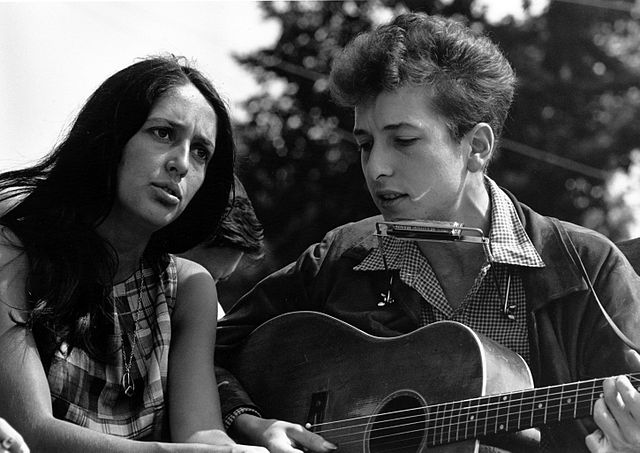
Soplando en el viento (1962)
¿Cuántos caminos tiene que andar un hombre
antes de que le llaméis hombre?
¿Cuántos mares tiene que surcar la paloma blanca
antes de poder descansar en la arena?
Sí, ¿y cuánto tiempo tienen que volar las balas de cañón
antes de que sean prohibidas para siempre?
La respuesta, amigo mío, está soplando en el viento,
la respuesta está soplando en el viento.Sí, ¿y cuántos años puede existir una montaña
antes de ser bañada por el mar?
Sí, ¿y cuántos años deben vivir algunos
antes de que se les conceda ser libres?
Sí, ¿y cuantas veces puede un hombre volver la cabeza
fingiendo no ver lo que ve?
La respuesta, amigo mío, está soplando en el viento,
la respuesta está soplando en el viento.Sí, ¿y cuánto tiempo tiene un hombre que mirar hacia arriba
antes de que pueda ver el cielo?
Sí, ¿y cuántos oídos tiene que tener un hombre
para que pueda oír a la gente gritar?
Sí, ¿y cuántas muertes se aceptarán, hasta que se sepa
que ya ha muerto demasiada gente?
La respuesta, amigo mío, está soplando en el viento,
la respuesta está soplando en el viento.
Blowin’ In The Wind
How many roads must a man walk down
Before you call him a man?
Yes, ’n’ how many seas must a white dove sail
Before she sleeps in the sand?
Yes, ’n’ how many times must the cannonballs fly
Before they’re forever banned?
The answer, my friend, is blowin’ in the wind
The answer is blowin’ in the windHow many years can a mountain exist
Before it’s washed to the sea?
Yes, ’n’ how many years can some people exist
Before they’re allowed to be free?
Yes, ’n’ how many times can a man turn his head
Pretending he just doesn’t see?
The answer, my friend, is blowin’ in the wind
The answer is blowin’ in the windHow many times must a man look up
Before he can see the sky?
Yes, ’n’ how many ears must one man have
Before he can hear people cry?
Yes, ’n’ how many deaths will it take till he knows
That too many people have died?
The answer, my friend, is blowin’ in the wind
The answer is blowin’ in the wind
Video de "Blowin' in the wind" en la versión original de la canción. | Video of "Blowin' in the wind" in the original version of the song:
Vídeo de "Blowin’ In The Wind" en el concierto "Live Aid" de 1985, acompañado de Keith Richards y Ron Wood.
Y finalmente la primera estrofa de su canción, "Los tiempos están cambiando" (1964):
Vengan todos a reunirse aquí
dondequiera que vaguen
y admitan que las aguas
que les rodean han crecido
y acepten que muy pronto
estarán empapados hasta los huesos
Si creen que vale la pena salvar este tiempo
entonces mejor comiencen a nadar
o se hundirán como una piedra
Porque los tiempos están cambiando
(Traducción: Gabriel Jiménez Emán)
And finally the first verse of his song, "Times are changing " (1964): Come all to gather here En estas fuentes puedes conseguir tanto poemas como más información acerca de Bob Dylan. | In these sources you can get both poems and more information about Bob Dylan.
wherever you roam
and admit that the waters
around you have risen
and accept that very soon
you will be soaked to the bone
If you think this time is worth saving
then you'd better start swimming
or you'll sink like a stone
Because times are changing
http://amediavoz.com/dylan.htm#George%20Jackson
https://goddylan.com/
https://www.bbc.com/mundo/noticias-37644233



Me gustó mucho esta publicación y cito esta estrofa que hace eco en mí:
“A veces pienso que el mundo entero
es un gran patio de prisión
algunos somos prisioneros
y otros somos guardias”
Esta idea también ha pasado por mi mente, el mundo es una gran cárcel y las diferentes circunstancias nos inclinan por alguna de estas dos brechas. Excelentes canciones que elegiste, tienen una crítica social contundente. En reiteradas ocasiones me he sentido frustrada presenciando cómo “El mundo se consume impune”, verso de mi poema Hebdómada. Nos seguimos leyendo. Saludos.
Gracias por tu apreciación tan personal. Los textos poéticos y las canciones de Bob Dylan son de un gran valor en la cultura contemporánea de la crítica social y civilizatoria. Un abrazo, @ramisey.
The rewards earned on this comment will go directly to the person sharing the post on Twitter as long as they are registered with @poshtoken. Sign up at https://hiveposh.com.
#posh
Pura poesía esas canciones!!! Me encantó este post, @josemalavem! Aquí estoy, escuchando música mientras tomo café. Buena sería una cerveza! jajaja. Abrazos
Pues, sí, son canciones de mucha fuerza lírica. Un buen modo de escuchar buena música: un cafecito o un licorcito, para levantar el espíritu. Un abrazo, @nancybriti.
Bob Dylan siempre será junto con John Lennon los artistas mas destacados en sus letras. Simplemente increíble !
Gracias por tu comentario, @chuitocastle. Comparto ese criterio. Saludos.
Muy buen post sobre la historia del rock y el amor a la musica. Gracias por hacerlo, me alegraste la noche con esto.